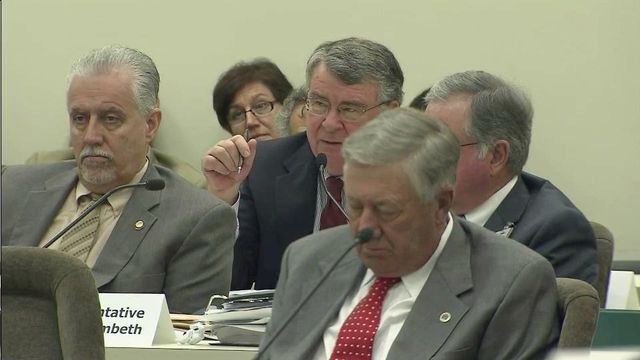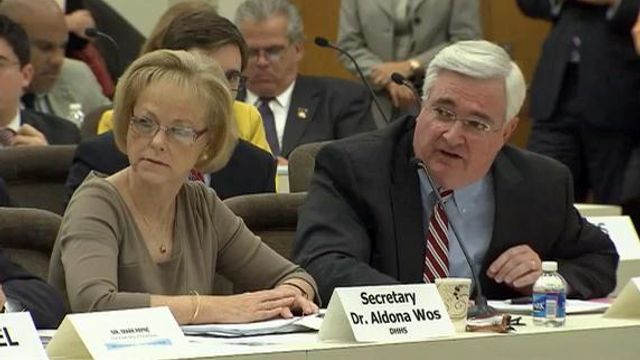DHHS faces skeptical questions on Medicaid payment system
Doctors, hospitals and other health care providers say they are having trouble getting paid for the services they provide. Lawmakers peppered the Department of Health and Human Services with questions about the system this morning.
Posted — Updated"There are a lot of people in here rolling their eyes and shaking their heads," Tucker said, prompting knowing smiles and head nods from medical practice managers, lobbyists and others who had crowded into an overflowing committee room.
Doctors, hospitals, medical device providers and other others have complained for three months that a new Medicaid system isn't paying them as quickly as they should.
"NCTracks has made billing go from complex to borderline impossible," said Sandra Williams, chief financial officer of Cape Fear Valley Health System. She said her hospitals have seen the number of denied claims skyrocket since the new system turned on July 1, saying the hospital is having trouble getting paid for basic services such as providing cancer drugs.
Others who spoke to the committee told similar stories to stories about glitches that made it impossible to get paid.
"As of Aug. 1, we have had to tell our staff that we we would no longer be able to accept new (obstetrics) Medicaid patients," said Lisa Arnold, a manager with Triangle Physicians for Women in Cary. "NCTracks has made it very difficult for us to continue to provide this care."
"We need answers - real answers and solutions - not ticket numbers," said Alicia Stakem of Goldsboro, who said she's been waiting for three months for answers from Computer Services Corporation, the private company tapped to design and run NCTracks.
It will be the end of the year before the system will be able to correctly process care provided to poor, pregnant women.
A gap between the stories
Medicaid is a health insurance program that covers roughly 1.6 million of North Carolina's 9 million residents. The bulk of those served are children or the parents of children from low-income families, along with pregnant women, the elderly and disabled.
NCTracks was designed to streamline provider payments, spot Medicaid fraud and provide state-level policy makers with detailed data on how quickly public dollars are being spent on the program.
"We will not be satisfied until every provider is paid for the services provided to the citizens of this state," said DHHS Secretary Aldona Wos, who was accompanied by key staff members as well as executives with CSC.
"We will fix these problems," pledged CSC's Mike Gaffney. "We are prioritizing the issues with the state, and we will get through these."
Although there are problems, Wos and others with the state said, the system was performing relatively well.
"The backlog on prior authorizations has been driven down to levels agreed upon in our contract," said Joe Cooper, the chief information officer for the department.
While there are still fixes that need to be made, he said, North Carolina's roll-out has gone more smoothly than similar networks did when they were put in place in other states.
"Our trajectory is good," Cooper said.
Members of the committee appeared to be unsatisfied with the answers they were getting, pointing to a gap between the stories they were hearing from providers and what they were being told by the department.
Typical was one moment during the hearing when DHHS officials were asked how much money they had spent on "hardship payments," money given to providers to help keep them in business while technical billing issues were worked out.
Cooper answered that the amount was $65 million. A second official answered $56 million. Rod Davis, DHHS' chief financial officer, answered $15.1 million.
"Hopefully, the department will confer and come up with a single number on that," said Rep. Nelson Dollar, R-Wake.
Other conflicts were noted between what providers who testified before the committee said and what DHHS officials said. For example, at various points during the discussion, Cooper and other officials said the backlog of pre-approvals – permission to provide a particular service before it is provided – had been cleared. Mike Gaffney, an executive with CSC, said the system was "completely caught up" on prior approvals.
But Kimberly Lynn with Carolina Apothecary of Reidsville, a durable medical device company, said her company is still having trouble getting paid and getting those prior approvals.
"This is a huge burden on providers and huge burden on patients getting access to care," she said.
Tucker was more blunt: "Do we have have a $800 million pig here we're trying to put lipstick on?" He told about providers in his area not getting paid and how they were in turn were unable to pay landlords.
"We've had a number of people furlough their employees," he said.
Tucker pointed out that, on a conference call Monday, senior legislative leaders were told that the Medicaid system had spent between $300 million and $450 million less than during the same period last year. Some of that savings, he said, would most likely be chalked up to providers simply not getting paid for the services they provided.
"That's great for our budget, but it's not fair to our providers," he said.
Cooper deflected the question, saying it was actually a very small difference between the two years.
Keeping an eye on the budget
Other lawmakers were worried that the system was not accurately tracking spending. That makes it impossible for the legislature and executive branch to keep an eye out for "surprises," such as $500 million in cost overruns that confronted the state this spring.
"What I didn't hear you say is is we currently have the tools in place to say where we are right now on our Medicaid budget," Sen. Pete Brunstetter, R-Forsyth, said.
Davis acknowledged that the richer, more accurate information promised to policymakers wouldn't be available until December.
"We're guesstimating as best we can," Davis said.
Dollar said that process needed to speed up. He noted that Community Care of North Carolina, which helps to manage Medicaid patients and provide information to the state, wasn't getting information that it had before July 1.
"If they're not getting that data, they can't do their job," Dollar said.
Tucker pointed out that uncertainty around Medicaid continued to eat up tax dollars and said the lack of data made it impossible to plan.
"I could not budget in my business if I had this hanging over my head," he said. "We cannot fly by the seat of our pants any more than these providers can."
Toward the end of the hearing on the NCTracks system, Sen. Martin Nesbitt, D-Buncombe, asked when the system would be running as it should.
"I heard today that all the problems that were raised can be addressed easily. Well then, do it," Nesbitt said. "We cannot run a system based on putting out fires and handling complaints."
Wos replied that it was the state's obligation to make sure providers were paid but did not put a date on when operation would be running as it should.
"I'll address this to anyone who can give me the answer," Nesbitt repeated after Wos spoke. "When do we expect these problems to be solved?"
Cooper said all providers should be at least be able to submit their claims by the end of November. But, he added, there there would likely be nagging issues for a long time.
"We will have problems for months to come," Cooper said.
• Credits
Copyright 2024 by Capitol Broadcasting Company. All rights reserved. This material may not be published, broadcast, rewritten or redistributed.






